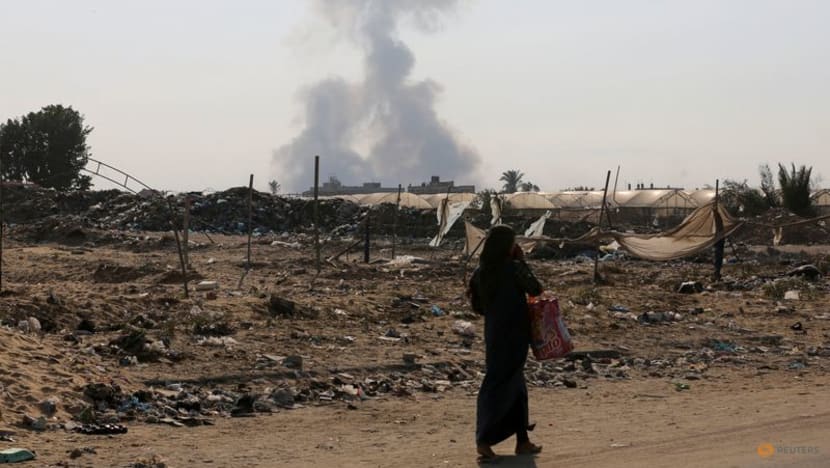Terrorism threat elevated since renewed Israel-Palestine conflict; Singapore also affected: ISD
The ongoing war in Gaza has generated "emotive responses" worldwide, with an uptick in anti-Singapore rhetoric on social media from regional extremist elements, said the Internal Security Department.

Smoke rises following Israeli strikes during an Israeli military operation, amid the Israel-Hamas war, in Khan Younis, in the southern Gaza Strip, Jul 24, 2024. (Photo: Reuters/Hatem Khaled)

This audio is generated by an AI tool.
SINGAPORE: The threat of terrorism has risen since the reescalation of the Israel-Palestine conflict on Oct 7 last year, and developments since have also impacted Singapore, the Internal Security Department (ISD) said on Thursday (Jul 25).
“The conflict has generated emotive responses worldwide, including acts of violence, and terrorist elements have leveraged the conflict to further their agenda and called for attacks,” the agency said in the Singapore Terrorism Threat Assessment Report 2024.
The longstanding conflict had escalated after Hamas launched a large-scale surprise attack against Israel from the Gaza Strip, with the latter responding with airstrikes and an invasion of Gaza.
The US Director of National Intelligence Avril Haines said in March this year that “it is likely that the Gaza conflict will have a generational impact on terrorism”.
ANTI-SINGAPORE SENTIMENTS
Terrorist groups, like the Islamic State in Iraq and Syria (ISIS) and Al-Qaeda, have used the conflict to recruit new members, calling on Muslims worldwide to support their Palestinian brethren. Hamas leaders have also called for attacks against those linked to Israel, the US and their allies.
“There has been an uptick in anti-Singapore sentiments on social media, among regional netizens who perceive Singapore to be pro-Israel,” ISD said.
“Some regional extremist elements have also taken issue with Singapore’s contribution of personnel to Operation Prosperity Guardian, and have made online posts inciting for Singapore to be targeted.”
The US-led Operation Prosperity Guardian aims to secure maritime shipping through the Red Sea.
The ISD noted that there have been social media posts calling for attacks against Singapore using “bombs” and “rockets”, and calling for the country to be “destroyed” and “wiped out”.
State actors and their proxies may engage in attacks against adversaries, including in third countries.
Singapore’s interests may hence be caught in the crossfire, amid heightened tensions in the Middle East, said the ISD.
For instance, the Yemen-based Houthis have reportedly attacked over 80 commercial vessels since November last year, targeting vessels linked to Israel – including those whose owners have business with the Israelis.
In the past months, at least two Singapore-flagged vessels have been struck in these attacks, said ISD.
Transnational terrorist groups have also plotted attacks against Israeli and Jewish interests in third countries outside of the conflict zones.
A Hezbollah-linked plot in Brazil was reportedly foiled last November, while European authorities thwarted a Hamas plan to attack targets across Europe last December.
“While there is no indication of an imminent threat to Singapore, vigilance is required, given that militants linked to these groups have previously planned and conducted terrorist attacks here,” the ISD said.
SELF-RADICALISATION PREVALENT
A 14-year-old – the youngest ISA case to date – and a 33-year-old former public servant were revealed earlier this month to have been radicalised due to the Israel-Hamas conflict. The third case was a 16-year-old radicalised by far-right extremist ideologies.
This underscores the radicalising risk that foreign extremist narratives can pose to Singapore’s own national security and social harmony, said the ISD.
“In general, my plan is to go to a kuffar (non-Muslim) festive celebration and start attacking random people. I will also use this opportunity to mobilise my group to ensure that the effort achieves the maximum impact and create a sense of fear among the kuffars,” said the 14-year-old, in an extract of his investigation statement released by ISD.
Self-radicalisation continues to be the primary driver of the terror threat in Singapore, according to the ISD.
Since 2015, 52 self-radicalised individuals – 40 Singaporeans and 12 foreigners – have been issued with orders under the Internal Security Act (ISA). Among them are 13 Singaporean youths aged 20 or younger.
ISD has dealt with three such cases since July last year, with all issued Restriction Orders.
REGIONAL THREAT REMAINS
ISD also noted that Islamist terrorism remains at the forefront of the global terrorism threat landscape, in particular through ISIS.
The group has transitioned into a covert organisation, and is behind the protracted insurgency in Iraq and Syria, while maintaining a terror campaign across the world.
It remains the primary threat actor in Southeast Asia too, where there have been ISIS-linked or inspired attacks and foiled plots, said ISD.
In May this year, 21-year-old Radin Luqman was inspired by extremist ideology to attack a police station in Ulu Tiram, about 20km away from Johor Bahru in Malaysia. He killed two police officers and left one injured, before he was killed in an ensuing firefight.
Singapore's Ministry of Home Affairs confirmed last month that his mother, 59-year-old Rosna Jantan, is a Singapore citizen.
“Public vigilance and preparedness are key to our defence against terrorism. The authorities will not always be able to neutralise plots before they are actualised, or identify radicalised individuals before they act,” said the ISD.
“It is critical that the public remains strongly vigilant to the possibility of a terrorist attack against the country, and that such an attack may be successful.”
The agency urged anyone with information on terrorism-related activities or suspects someone may be radicalised, to contact the ISD Counter-Terrorism hotline at 1800-2626-473.










.png?itok=-tinqe5n)







